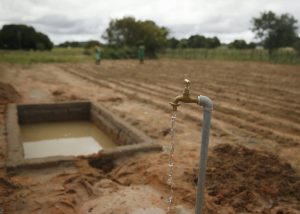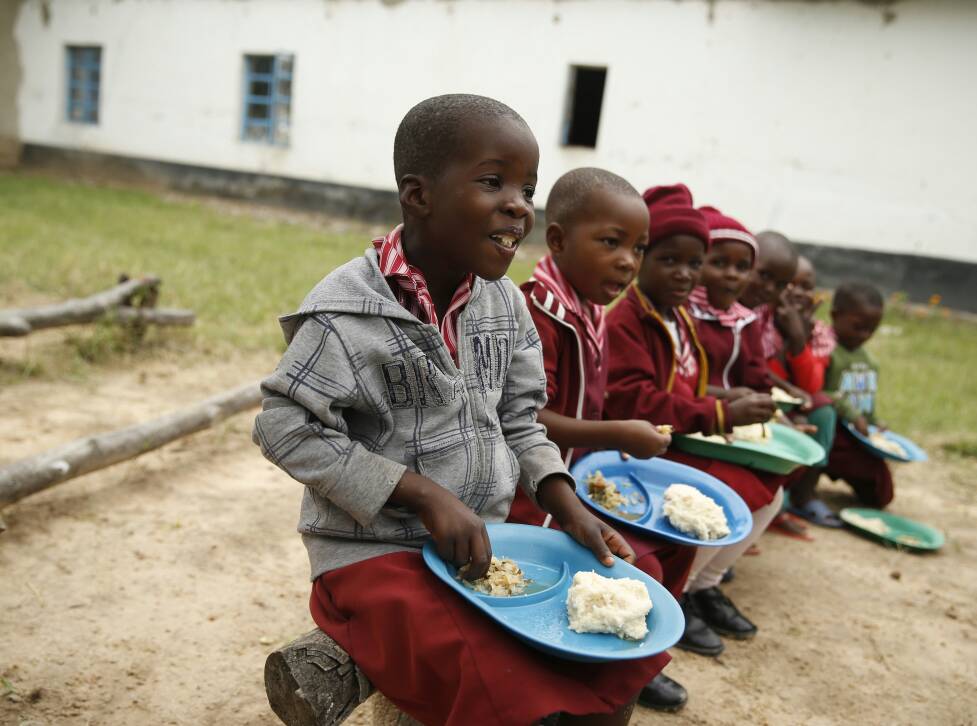By Byron Mutingwende
School feeding is an essential tool for development since it fosters food and nutrition security, Vice President Kembo Mohadi has said.
Vice President Mohadi made the remarks on the occasion of the third edition of the African Day of School Feeding that was officially opened on 1 March 2018 in Harare and celebrated under the patronage of the Zimbabwean government. This year’s theme is ‘Realising the African Child’s Full Potential through Effective Home-Grown School Feeding.’
“School feeding is an essential tool for development which Zimbabwe considers as an investment in a special context, other than merely attracting learners to school,” said Honorable VP Mohadi, “We need to bear in mind that failure to invest in food and nutrition security, particularly for children, would retard the development of our countries in socio-economic terms,” he added.
A special event was held at Glen View No. 2 Primary School in the Zimbabwean capital, Harare, and complemented by a series of official conferences in the city. Senior officials attended it from the African Union as well as ministers, deputy ministers from Cote d’Ivoire, Gambia, Niger, South Sudan, and Liberia and representatives from over 30 African countries. Also present were development partners, and members of the diplomatic corps and civil society.
Reverend Wyson Dutch, the coordinator of the school-feeding programme at one of the schools in Harare said in the past the government had been providing maize with no relish.
“We are appealing for dried beans, fish, kapenta, cooking oil and salt from well-wishers. This is also an opportunity for Christians to make an impact into these schools. You may also think to donate some Bibles. Please help and take advantage of this opportunity,” Rev Dutch said.
The World Food Programme Zimbabwe has been offering technical support to the government school feeding programme. In Zvishavane District, WFP is implementing a water source development programme and 22 primary schools have benefited.

The Assembly of Heads of State and Government instituted the African Day for School Feeding during the 26th African Union Summit in January 2016 in recognition of the immense value of Home-Grown School Feeding (HGSF). With HGSF, food is sourced from local smallholder farmers, thus boosting income generation and entrepreneurship in local communities. School meals have been proven to enhance retention and improve the performance of children in school – as well as enhancing a child’s concentration in class, they have long-term economic benefits, raising productivity throughout a lifetime.
“It is important that more local resources are invested in developing Home Grown School Feeding, to build self-reliance and long term resilience. The academic community is also called upon to contribute to the knowledge base of school feeding to ensure optimal outcomes,” said H.E. Prof. Sarah Anyang Agbor, Commissioner for Human Resources, Science and Technology of the African Union.
“The World Food Programme helps more than 26 million children receive school meals throughout Africa and we know that when those little boys and little girls go to school, they develop friendships and they also get a nutritional meal,” said Executive Director of the UN World Food Programme WFP David Beasley by video link. “When we help children, we help the economy in their communities, their countries and all throughout the world.”
Everyday, nearly 10 million children receive a meal at school in Africa. WFP supports or implements school meals in 40 countries on the continent.
“WFP is committed to support countries implement Homegrown School Feeding Programmes in Africa,” said WFP Senior Director Strategic Coordination and Support in the Office of the Deputy Executive Director, Stanlake Samkange.
An AU review, ‘Study on Sustainable School Feeding Across the African Union’ was launched at the event. The WFP Centre of Excellence Against Hunger in Brazil and the Economic Policy Research Institute of South Africa supported the review. The report notes several strong outcomes of school feeding including: increased attendance and enrolment at school; reduced repetition and dropout rates; improved retention, cognitive performance, and completion and promotion rates. It also notes the positive impact of school meals on children’s height, weight, micronutrient status, and general health. It noted, however, the need for more efforts to measure the returns from school feeding, particularly over the long-term
